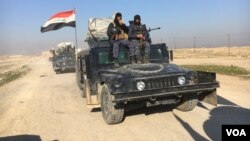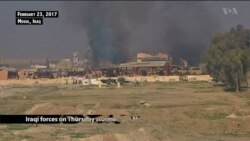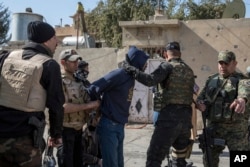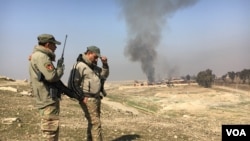Iraq military officials say their U.S.-backed forces have retaken the airport in Mosul that had been controlled by the extremist Islamic State group since 2014.
In a flash on its screen, state television declared, “The Rapid Response Forces and federal police are fully in control of the airport of Mosul.”
Officials said Friday the military has also now retaken a sprawling military base next to the airport, and have entered a Mosul neighborhood for the first time in months.
Iraqi forces launched a new bid to retake the western areas of Iraq’s second-largest city on Sunday after saying in late January they had liberated eastern parts of the city.
Iraqi Lieutenant General Raid Shakir Jaudat said Baghdad's forces, backed by drones and heavy artillery, had advanced on the airport from several positions. At first, accounts of the airport takeover said there was little Islamic State resistance, but later there were reports of Iraqi firefights with militants encamped in airport buildings.
One Iraqi special forces officer reported IS fighters had targeted Baghdad's fighters with a suicide car bomb and dozens of bombs dropped from drones. The officer said there were at least a dozen casualties, although many were light injuries.
"Daesh [IS] resistance is not inconsiderable, but they are trying to save their strength for inside the city," First Lieutenant Ahmed al-Ghalabi of the Rapid Response Forces said outside the airport's main entrance.
An Iraqi takeover of the airport would give its troops access to the city from the southwest and for the first time control of an area along the west bank of the Tigris River.
Another commander, Hisham Abdul Kadhem, said, "Right now, thank God, we're inside Mosul airport and in front of its terminal. Our troops are liberating it."
Little was left inside the airport, and what was once a runway was littered with dirt and debris. IS forces had leveled other buildings in the airport complex.
The Iraqi forces also seized an IS weapons storage warehouse, as well its onetime headquarters and barracks.
But the advance to retake the remainder of western Mosul may take some time. It took three months for Iraqi forces to seize control of the eastern part of the city.
International relations professor Houchang Hassan-Yari of the Royal Military College of Canada told VOA's Persian service that the concentration of civilians in western Mosul would make it harder for Iraqi government forces and their coalition allies to retake that part of the city.
"Comparing this situation to the recent battle for the Syrian city of Aleppo, Syrian government forces and their Russian allies directly attacked civilians [as they retook the city last November and December]," said Hassan-Yari on VOA Persian's NewsHour program. "In Mosul, Iraqi government forces and their U.S.-led coalition partners have significantly restricted themselves in terms of the firepower they are using, in order to save the lives of civilians."
Damascus and Moscow have denied targeting civilians in Aleppo.
U.S. on front lines
U.S. forces have played a key role in the advance of Baghdad's troops, launching airstrikes and providing advisers on the ground. On Thursday, U.S. forces were seen on the front lines of the attack.
The American forces are not supposed to be engaged in the fighting under Washington's terms of the U.S. involvement in Iraq. But a coalition spokesman, Air Force Colonel John Dorrian, said Wednesday that in recent weeks they have gotten so close to the front that they have come under attack near Mosul and returned fire.
Thousands of Iraqi forces have been involved in the advance on Mosul, while U.S. officials say they think that only about 2,000 jihadists remain in the city. But the fight for control of densely populated western Mosul is likely to be fierce. It includes the Old City and its narrow streets, which are impassable for some military vehicles.
Residents of western Mosul report that food supplies are dwindling, but residents on the liberated eastern side of the city are expressing their support.
In Photos:
On Wednesday, an army plane dropped thousands of letters from residents of the retaken eastern side into the western area.
One letter said, "Be patient and help each other ... the end of injustice is near." It was signed "People from the east side."
Earlier this week, U.S. Defense Secretary Jim Mattis visited Iraq and vowed that the U.S. would support Iraq in its fight against IS jihadists.
When asked whether the United States would stay in Iraq after the battle for Mosul had ended, he said, "I imagine we'll be in this fight for a while and we'll stand by each other."
There are an estimated 750,000 civilians in western Mosul, essentially under siege by Iraqi forces, along with IS fighters.
Many of those civilians in western Mosul were forced out of the eastern part of the city during heavy fighting there last month.
Meanwhile, aid agencies are worried and preparing for the possibility that up to 250,000 people might flee Mosul in the coming days or weeks.
The U.N. refugee agency has said it is focusing its efforts on building new camps to house the displaced. The U.N. High Commissioner for Refugees has completed eight camps and says it is planning to start work at another site south of Mosul.
Parisa Farhadi and Sara Dehghan of the VOA Persian service contributed to this report.










